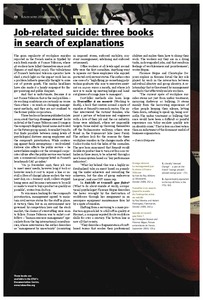Job-related suicide: three books in search of explanations [Book review]

2010
02
40
case study ; personnel management ; psychosocial risks ; suicide ; work organization ; work load
Psychosocial risks
English
"The grim regularity of workplace suicides reported in the French media is typified by each fresh suicide at France Télécom, where 46 workers have killed themselves since 2008 (figures at mid-April 2010). The tribulations of France's historical telecom operator have shed a stark light on the impact work has on a problem hitherto generally thought to arise out of private griefs. The media headlines have also made it a handy scapegoat for finger- pointing and public disquiet.
And that is unfortunate. Because it is not France Télécom that is the real problem – its working conditions are certainly no worse than others – so much as changing management methods, and they are not confined to the former public corporation.
Three books on the issue published in late 2009 avoid this trap. Orange stressé1 looks in detail at the France Télécom case (Orange is the company's flagship brand name and touted as the future group name). Journalist Ivan du Roy finds parallels between rising levels of psychological distress among employees and the company's privatization. While cautioning against facile assumptions – work-related distress also affects the public service – he nevertheless singles out the revamped corporate culture after the public service was turned into a commercial company listed in France's benchmark CAC 40 index.
"On 31 December 1997, their job was to meet users' needs, however long it took or however much it cost to repair a line or install a (free of charge) phone socket; the very next day, on 1 January 1998, callers stopped being users and became customers to be sold or made to want to buy a product as quickly as possible", writes Ivan du Roy.
To win union backing for the company's privatization, management agreed to maintain civil service status for the staff in place. A victory, then; but in an environment now governed by competition laws and the stock market, the claims of overstaffing were soon to follow. France Télécom was to enlist costkillers – "human resource management" specialists from the big international consultancies, whose intervention the author describes as "management by uncertainty" (consisting in imposed stress, enforced mobility, constant reassignment, sidelining and enforced retirement).
Office workers at all levels aged around fifty were the first casualties. Anything went to squeeze out these employees who enjoyed protected civil servant status. The author cites one case of a "high-flying 50-something polytechnic graduate who rose to executive assistant on 10,000 euros a month, and whose job now is to make up meeting badges and hand out glasses of orange juice to managers".
Cost-killer methods also loom large in Travailler à en mourir (Working to death), a book that centres around a spate of suicides at Renault's research centre. The author interviewed the victims' families, who paint a picture of technicians and engineers with a love of their job and the car industry. Some were sidelined, others set impossible targets. Some ended up throwing themselves off the Technocentre walkway, others were found in the Guyancourt lake (near Paris). The authors look for the reasons for these workplace suicides in the changes made after Carlos Goshn took the helm of the carmaker. The new boss announced that Renault would double its product line to turn out 800 000 vehicles in three years, to be achieved through a new bonus system based on "key performance indicators".
"What lay behind this was a highly individualised take on merit based on punishing the under-achievers and rewarding the achievers, but the idea of group endeavour has gone", said one CGT union rep.
In Suicide et travail: que faire? (What to do about suicide at work), occupational psychologist Florence Bègue describes the havoc wrought by the destruction of workforces through her assignment in an aerospace equipment maintenance firm hit by a spate of suicides.
Shifting from a servicing to a mass production approach led to a fall-off in quality at Mermot, a company reputed for its workforce skills for over a century. The bottom line is now all that counts.
"They describe a fragmentation of craftbased teams that erodes their professional abilities and makes them have to skimp their work. The workers say they are in a dying trade, in downgraded jobs, and that results in feelings of worthlessness and pointlessness", writes Bègue.
Florence Bègue and Christophe Dejours explore in forensic detail the key role played by work in the interaction between individual identity and group identity. A relationship that is threatened by management methods that effectively isolate workers.
"The current spate of workplace suicides stems not just from unfair treatment, incurring disfavour or bullying. It stems mainly from the harrowing experience of other people keeping their silence, letting them down, refusing to speak up, being cowardly. The unfair treatment or bullying that once would have been a difficult or painful experience can today escalate quickly into an identity crisis." That is less an observation than an indictment of the dominant model of business organization. — Denis Grégoire"
Digital;Paper
See also
-
[Article]
Suicide et travail : trois livres pour comprendre [Book review]
/ 1.
HesaMag, 2010, n° 02. - 44
-
[Book]
Suicide et travail : que faire ?
/ 1 ; 1.
PUF, 2009. - 130 p.
ISBN 978-2-13-057648-8
-
[Book]
Orange stressé. Le management par le stress à France Télécom
/ 1.
La Découverte, 2009. - 252 p.
ISBN 978-2-7071-5859-8
-
[Book]
Travailler à en mourir. Quand le monde de l'entreprise mène au suicide
/ 1 ; 1.
Flammarion, 2009. - 243 p.
ISBN 978-2-081221987